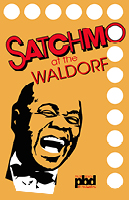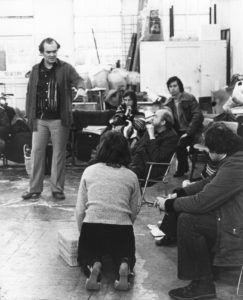I took a look yesterday at a list of the twelve top-grossing movies in North America. I’d heard of four of them: I read the novel on which Thank You for Smoking is based when it came out a few years ago, and I’ve seen posters for Phat Girlz, Failure to Launch, and She’s the Man while walking to and from the gym. The other eight weren’t even names to me, nor do I plan to seek them out. As I mentioned in this space a few weeks ago, I haven’t been to a movie theater since last October, and it’s been at least a year since I last saw a first-run episode of any TV series (not counting cooking shows, which I regard as a species of soft porn). As for pop music, the only new songs I hear are the ones that happen to be playing on the radios of the cabs that take me to and from the theater district.
I can’t remember when I’ve been so completely out of touch….
Read the whole thing here.




 Not only is Satchmo my first play, but this is my debut as a professional stage director. While Barry Shabaka Henley, the star of the show, appeared in the Chicago debut of Satchmo earlier this season, every other aspect of Palm Beach Dramaworks’ version is brand-new. I’m working with a talented team of designers who will be giving the West Palm Beach production its own distinctive look and sound, and I’m also hoping to bring to the table some fresh ideas of my own.
Not only is Satchmo my first play, but this is my debut as a professional stage director. While Barry Shabaka Henley, the star of the show, appeared in the Chicago debut of Satchmo earlier this season, every other aspect of Palm Beach Dramaworks’ version is brand-new. I’m working with a talented team of designers who will be giving the West Palm Beach production its own distinctive look and sound, and I’m also hoping to bring to the table some fresh ideas of my own. How did I prepare for this improbable adventure? Mostly by watching Rus, Gordon, and Charlie rehearse Satchmo, then asking them questions about what they did and why they did it. But I also read three books about stage directing that I found helpful: Alan Ayckbourn’s
How did I prepare for this improbable adventure? Mostly by watching Rus, Gordon, and Charlie rehearse Satchmo, then asking them questions about what they did and why they did it. But I also read three books about stage directing that I found helpful: Alan Ayckbourn’s  I should add that I don’t think of this production as “my Satchmo.” It is, like all theatrical productions, a collaboration, and I make no claim that it will somehow be “more right” than its predecessors merely because it happens to have been directed by the playwright. To me it feels more like I’m staging a play written by a stranger, albeit one whose script I happen to know unusually well. My goal is to do as well by the play as I possibly can, and to help my colleagues give of their best. It’s not about me: it’s about us.
I should add that I don’t think of this production as “my Satchmo.” It is, like all theatrical productions, a collaboration, and I make no claim that it will somehow be “more right” than its predecessors merely because it happens to have been directed by the playwright. To me it feels more like I’m staging a play written by a stranger, albeit one whose script I happen to know unusually well. My goal is to do as well by the play as I possibly can, and to help my colleagues give of their best. It’s not about me: it’s about us. The premise of the novel is that Patrick Bateman, Mr. Ellis’ businessman-butcher, is the Reagan Era incarnate, a soulless materialist who loves only the luxury objects he owns, all of which he identifies by brand name whenever he has occasion to mention them. (You can imagine how old this gets over 399 pages.) The joke is that being soulless, he has no taste, and determines the value of his luxury objects exclusively by what they cost. We are meant to sneer when he describes Whitney Houston as “the most exciting and original black jazz voice of her generation,” which I suppose is the aesthetic equivalent of virtue signaling….
The premise of the novel is that Patrick Bateman, Mr. Ellis’ businessman-butcher, is the Reagan Era incarnate, a soulless materialist who loves only the luxury objects he owns, all of which he identifies by brand name whenever he has occasion to mention them. (You can imagine how old this gets over 399 pages.) The joke is that being soulless, he has no taste, and determines the value of his luxury objects exclusively by what they cost. We are meant to sneer when he describes Whitney Houston as “the most exciting and original black jazz voice of her generation,” which I suppose is the aesthetic equivalent of virtue signaling….